8 Best Website Builders in 2024

A website builder is a unique software or online tool that permits users to create and design websites without having to write code or have technical web development skills.
Website builders typically provide a user-friendly interface with drag-and-drop functionality, pre-designed templates, and various customization options, making it easy for people or businesses to create their websites quickly and easily.
Is a Website Builder Suitable for a Small Business?
A website builder can be a suitable option for a small business, depending on its specific needs and requirements. Website builders are online tools that allow users to create websites without extensive coding or technical skills. They often provide:
- Pre-designed templates.
- Drag-and-drop functionality.
- Other user-friendly features that make it easy for small businesses to create a professional-looking website.
Here are some aspects to consider when resolving if a website builder is suitable for a small business:
- Budget: Website builders are generally cost-effective compared to hiring a professional web developer. Small businesses with limited budgets can benefit from the affordability of website builders, which often offer various pricing plans to fit different budgets.
- Ease of use: The website builder’s interface is user-friendly, with intuitive interfaces that make creating and managing a website easy. Small business owners needing more technical expertise can create and update their websites without hassle.
- Customization options: Website builders typically offer a range of templates and customization options, allowing small businesses to tailor their websites to their specific branding and content needs. However, ensuring that the website builder you choose offers enough customization options to meet your business’s unique requirements is essential.
- Time constraints: Website builders can be a time-efficient option for small businesses that must launch a website quickly. With pre-designed templates and easy-to-use tools, small business owners can create a website in a relatively short amount of time.
- Scalability: Some website builders may have limitations in terms of scalability and may need to be more suitable for businesses with complex requirements or plans for significant growth. Choosing a website builder that can accommodate your business’s future needs is essential.
- Technical support: Many website builders provide technical support and customer service, which can benefit small business owners who may encounter issues or have questions while building and managing their websites.
In summary, a website builder can be a suitable option for a small business if it aligns with its budget, ease of use, customization needs, time constraints, and scalability requirements and provides adequate technical support. Researching and choosing a reputable website builder that meets your specific needs and goals is essential.
Is Website Builder Easy to Use?
Website builders are designed to be user-friendly and require little to no coding or technical expertise. They typically offer a drag-and-drop interface, pre-designed templates, and easy-to-use customization options, making them accessible to users with varying levels of technical skill.
The difficulty of using a website builder can vary depending on the explicit platform and the features you want to utilize. Website builders usually are intuitive and straightforward, with step-by-step guides and tutorials to help users along the way. Many website builders provide a visual preview of how the website will look as users make changes, allowing for real-time feedback and adjustments.
Users with basic computer skills and familiarity with web browsing and editing content in a word processor should be able to learn and use a website builder with relative ease. Most website builders also offer support through customer service channels, such as live chat, email, or phone, as well as documentation and community forums to help users with questions or issues.
That said, if you have more advanced requirements or complex design needs, such as extensive custom coding, complex integrations, or unique design elements, you may encounter a steeper learning curve or need a professional web designer or developer assistance.
Website builders aim to simplify the website creation process and make it accessible to many users. Still, the ease of use can vary depending on the specific platform and the complexity of the website you want to create. It’s always an excellent notion to start with the platform’s tutorials and documentation, and don’t hesitate to seek help from customer support or professional assistance if needed.
Are Website Builders Search Engine Friendly?
Website builders can perform well on search engines, but it depends on several factors. Let’s have a look at the following considerations to keep in mind:
SEO Features: Many website builders offer built-in SEO (Search Engine Optimization) features that can help improve the search engine visibility of your website. These may include options for customizing meta tags, alt tags, URL structure, and other on-page SEO elements. Website builders that provide robust SEO features and permit you to optimize your website for search engines can help improve its performance in search engine rankings.
Content Quality: Content is a critical factor in SEO. Creating high-quality, original, and appropriate content that provides value to your users and aligns with your target keywords and topics is essential. Website builders offer the framework for creating websites, but your content’s quality, relevance, and uniqueness are crucial for search engine performance.
Mobile Responsiveness: With the increasing use of portable devices for internet browsing, having a mobile-responsive website is crucial for SEO. A mobile-responsive website is considered a best practice for SEO and can positively impact your search engine rankings. Most modern website builders offer mobile-responsive templates that automatically adapt to diverse screen sizes, ensuring a seamless experience for users across devices.
Website Speed: Website speed is another critical factor in SEO. Slow-loading websites can negatively affect user experience and search engine rankings. Many website builders optimize website performance, including page load times, image optimization, and caching, to ensure fast and efficient website performance.
Customization and Flexibility: Some website builders may have limitations in terms of customization and flexibility, which can affect SEO. For example, if a website builder does not allow you to customize certain SEO elements, such as meta tags or URL structure, it could impact your ability to optimize your website for search engines.
Backlinking and Off-page SEO: Off-page SEO factors, such as backlinking, social media engagement, and online reputation management, are not directly related to website builders, but they can impact your website’s search engine performance. Website builders provide the foundation for your website, but you must actively engage in off-page SEO strategies to build your website’s authority and reputation online.
Website builders can perform well on search engines if you optimize your website for SEO, create high-quality content, ensure mobile responsiveness, optimize website speed, and engage in off-page SEO strategies. Choosing a website builder with robust SEO features, customization options, and flexibility is essential to ensure you have the tools to optimize your website for search engines.
Types of Website Builders
Several types of website builders are available, each with its own features, advantages, and limitations. Here are some common types of website builders:
- Drag-and-Drop Website Builders: These website builders offer a visual interface allowing users to design websites with drag-and-drop elements onto a canvas. Users can often choose from pre-designed templates, customize layouts, and add text, images, videos, and other details without coding skills. Examples of drag-and-drop website builders include Wix, Weebly, and Squarespace.
- Template-Based Website Builders: These website builders provide pre-designed templates that users can customize by adding their content, images, and other elements. Template-based website builders typically offer less flexibility than drag-and-drop builders, but they can be more straightforward. Examples of template-based website builders include WordPress.org, and Shopify.
- E-commerce Website Builders: These website builders create online stores and sell products or services online. They typically include features such as product listings, shopping carts, payment gateways, and inventory management. Examples of e-commerce website builders include Shopify.
- Code-Based Website Builders: These website builders are more advanced and require coding skills to design and develop websites. They provide more flexibility and customization options than drag-and-drop or template-based builders but also need higher technical expertise.
- Website Builders for Specific Niches: Some website builders cater to specific niches or industries, such as portfolio websites for creatives, restaurant websites, or real estate websites. These specialized website builders often come with industry-specific templates and features tailored to the needs of that particular niche.
- Open Source Website Builders: These website builders use open-source software and allow users to access and modify the source code of their website. Open-source software provides more flexibility and customization options for advanced users who have coding skills. Examples of open-source website builders include WordPress.org.
These are just periodic samples of the types of website builders available. It’s important to carefully evaluate the features, flexibility, ease of use, pricing, and support offered by different website builders to choose the one that best fits the needs and requirements of your small business.
Best Website Builders
Website builders have become increasingly popular due to their comfort of use, affordability, and ability to create professional-looking websites without technical expertise. They are a suitable option for those who want to construct a website quickly and efficiently, without the need for coding skills or hiring a professional web developer.
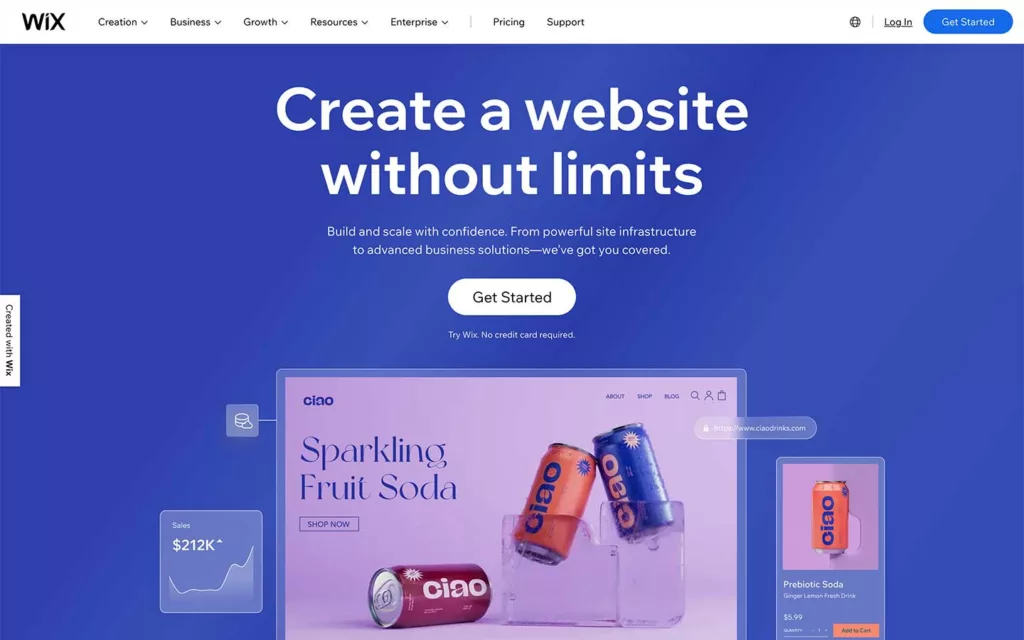
WIX
Wix is a famous online website builder allowing users to create stunning websites without coding skills. Its spontaneous and intuitive drag-and-drop interface allows users to easily add and customize elements to their web pages, such as text, pictures, tapes, and interactive features.
Wix offers a wide range of professionally-designed templates for various websites, including business websites, online stores, blogs, portfolios, and more.
Users can customize their website’s design, layout, and functionality to suit their needs. Wix also provides features like domain registration, website hosting, SEO tools, e-commerce capabilities, and various third-party integrations, making it a comprehensive solution for building and managing websites.

Squarespace
Squarespace is a famous website builder known for its sleek and modern designs, making it a preferred choice for creative professionals and businesses focusing on aesthetics.
With Squarespace, users can choose from a wide range of beautifully crafted templates that are mobile-responsive and customizable to create unique and visually stunning websites.
The platform offers an easy-to-use drag-and-drop editor allowing users to add various content blocks to their web pages, such as text, images, galleries, videos, and forms. Squarespace also provides built-in features for blogging, e-commerce, analytics, and SEO, making it a comprehensive solution for creating and managing websites.
The platform also offers a robust set of tools for customization, allowing users to fine-tune their website’s design, layout, and functionality to match their brand identity. With its aesthetic appeal, ease of use, and powerful features, Squarespace is a popular choice for those seeking a visually striking online presence.
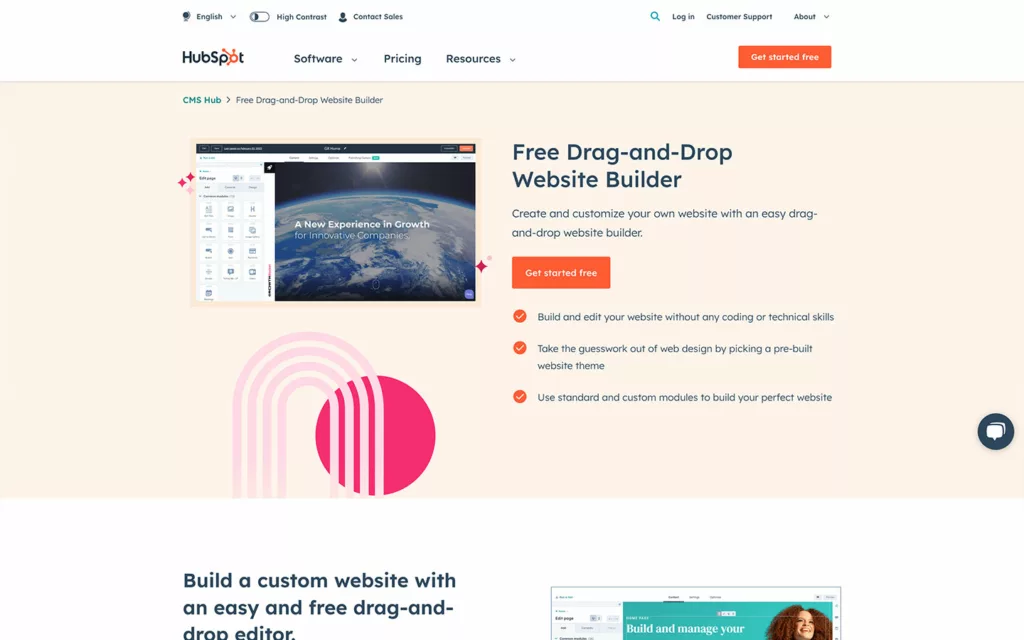
Hubspot
HubSpot is a renowned customer relationship management (CRM) and inbound marketing software platform. It provides tools and features that help businesses attract, engage, and delight customers.
HubSpot offers various functionalities, including marketing automation, email marketing, social media management, content management, lead generation, analytics, and sales enablement. It also includes a CRM system that helps businesses manage their contacts, leads, deals, and customer interactions in one centralized location.
One of the critical features of HubSpot is its inbound marketing approach, which focuses on creating valuable content to attract and engage customers organically rather than relying on traditional outbound marketing methods. HubSpot’s platform helps businesses attract visitors, convert them into leads, close deals, and delight customers with personalized content and interactions.
HubSpot is a comprehensive CRM and inbound marketing software platform that helps businesses manage their marketing, sales, and customer service efforts.
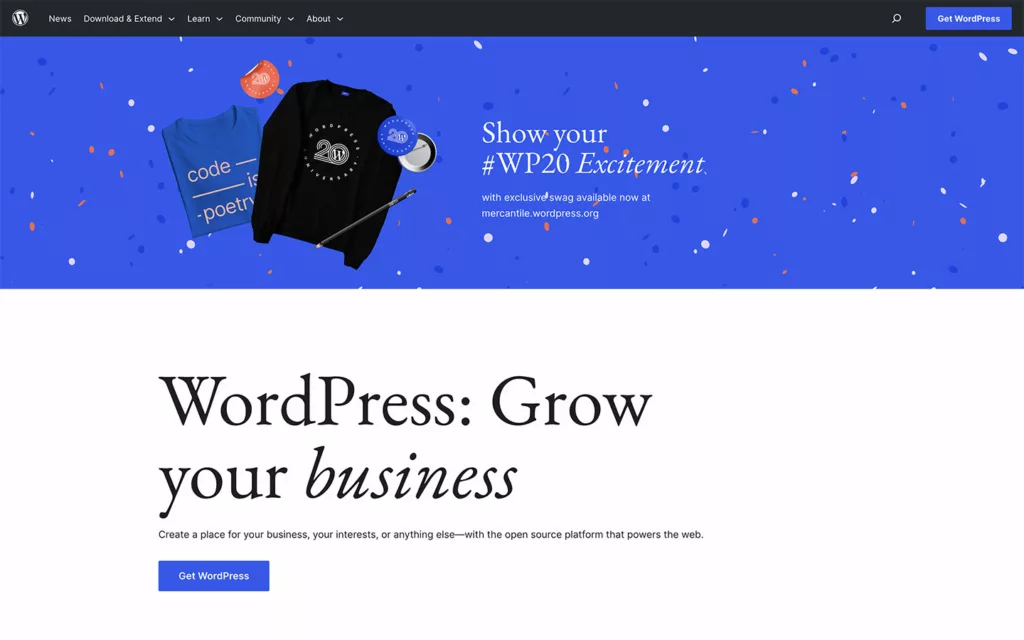
WordPress.org
WordPress.org, often called WordPress, is a free, easy-to-use, open-source content management system (CMS) that allows users to create and handle websites. It is one of the most widespread CMS platforms, powering millions of websites globally.
WordPress.org provides a flexible and extensible platform for creating various websites, including blogs, business websites, e-commerce stores, portfolios, forums, and more. It offers a vast ecosystem of themes, plugins, and support communities that allow users to customize their websites’ look, feel, and functionality.
As an open-source CMS, WordPress.org allows users to modify and customize the source code, making it highly adaptable and flexible. Many developers and users contribute to its development, support, and create plugins and themes.
WordPress.org provides a user-friendly interface, making it available to users with little or no specialized expertise. It offers many features, including content creation and management, media management, user management, search engine optimization (SEO) tools, and more. It also allows users to devise and organize their custom post types, taxonomies, and templates, providing a high level of customization.
WordPress.org is self-hosted, meaning users must have their domain name and web hosting to install and run the software. Self-hosted WordPress gives users complete control over their website’s hosting environment, security, and performance.
WordPress.org is a powerful and flexible CMS. Using WordPress, many individuals, businesses, bloggers, and organizations create and manage websites with varying complexities and purposes.
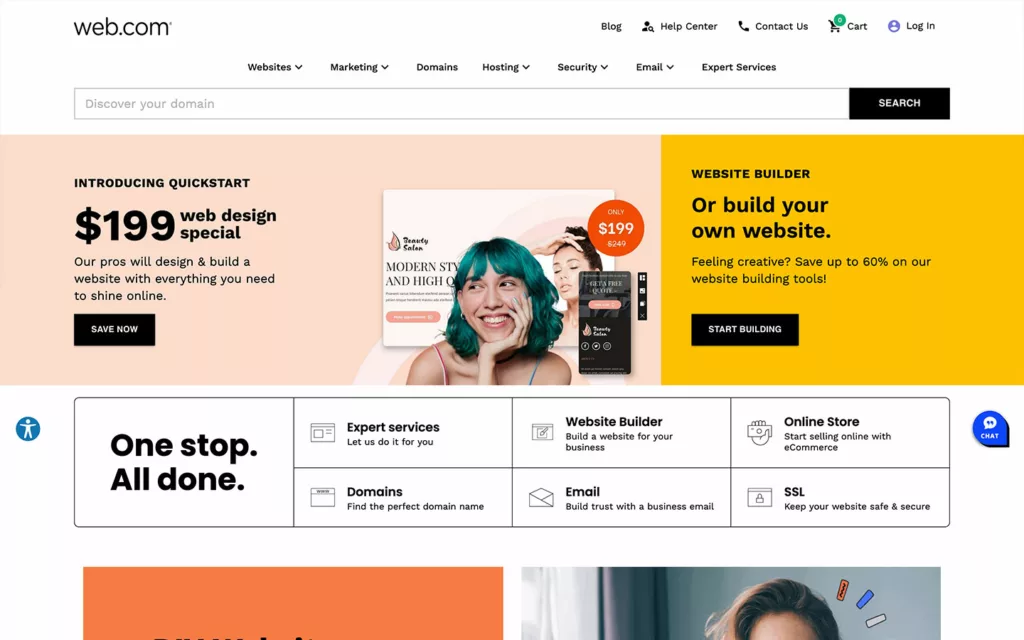
Web.com
Web.com is a website design and hosting company offering various web-related services to businesses and individuals. It provides tools and solutions for creating websites, online marketing, domain registration, web hosting, and e-commerce.
Web.com offers website design options, including do-it-yourself (DIY) website builders and professional web design services. Their website builder allows users to create websites using pre-designed templates, drag-and-drop functionality, and customization options. They also offer professional web design services where their team of experts can create custom websites tailored to the specific needs of businesses.
Web.com also provides web hosting services, including affordable shared hosting, powerful virtual private server (VPS) hosting, and the best-dedicated server hosting. These hosting options offer varying performance levels, resources, and control for websites.
In addition to website design and hosting, Web.com offers online marketing services, including social media control, search engine optimization (SEO), email marketing, search engine marketing (SEM), and more. These services help businesses improve their online presence and drive website traffic.
Web.com also offers domain registration services, allowing users to register and manage domain names for their websites. They provide domain extensions and domain management features, such as DNS management, domain forwarding, and domain privacy.
With DIY and professional solutions options, Web.com offers various web-related services for businesses and individuals, including website design, hosting, online marketing, and domain registration.
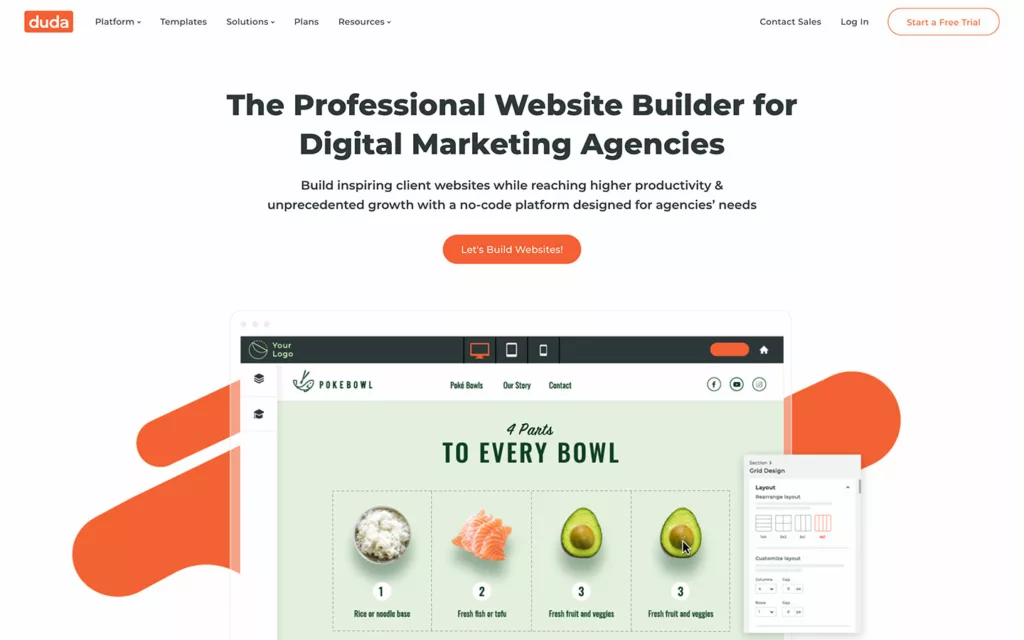
Duda
Duda is a website design and development platform that provides tools and solutions for creating responsive and mobile-ready websites. It delivers various features and functionalities that cater to the needs of web designers, digital agencies, and businesses.
One of the critical features of Duda is its responsive website builder, which allows users to create websites that adapt and display optimally on different devices, including desktops, tablets, and mobile phones. Duda offers a drag-and-drop interface, pre-designed templates, and customization options to design and customize websites according to specific requirements.
Duda also provides a white-label website builder, allowing web designers and digital agencies to create websites for their clients under their brand. This white-label option includes the ability to customize the platform’s interface, domain mapping, and client management tools, enabling businesses to offer website design services as part of their portfolio.
Duda offers a range of widgets and integrations to enhance the functionality of websites, including e-commerce tools, forms, social media integrations, maps, and more. It also provides options for multilingual websites, site personalization, and advanced design capabilities for more complex website projects.
In addition to website design, Duda offers website hosting and security features, including SSL certificates, site backups, and site monitoring. It also provides analytics and reporting tools to track website performance and visitor behavior.
Duda offers team collaboration features, allowing multiple users to work on website projects, share comments, and manage website content efficiently. It also integrates with third-party tools, such as CRM systems and marketing mechanization platforms, to streamline workflows and enhance productivity.
Duda is a website design and development platform focusing on responsive and mobile-ready websites, with features such as a drag-and-drop interface, white-label capabilities, integrations, hosting, and collaboration tools, catering to the needs of web designers, agencies, and businesses.
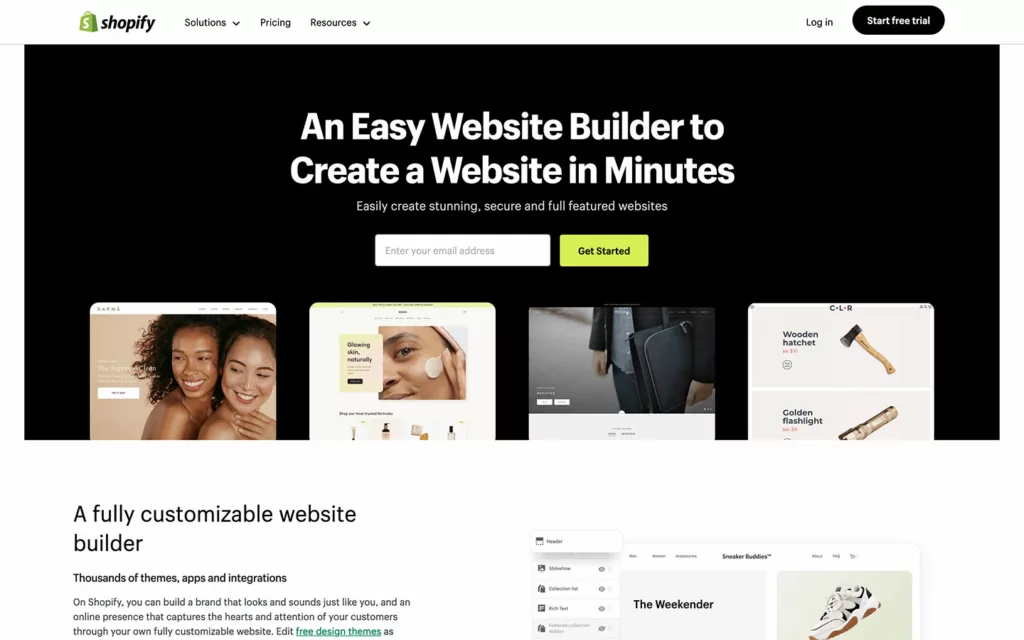
Shopify
Shopify is an e-commerce platform allowing businesses to create and manage online stores. It delivers a complete set of tools and features for building, customizing, and promoting online stores, making it a famous option for businesses of all sizes to start and grow their e-commerce ventures.
One of the critical elements of Shopify is its website builder, which allows users to create visually appealing and mobile-responsive online stores without coding or technical expertise. It offers a wide range of professionally designed templates that are effortless to customize and use to match businesses’ brand identity and product offerings.
Shopify provides a robust e-commerce platform, including features such as product management, inventory management, order management, payment processing, and shipping options. It also offers a variety of payment gateways, allowing businesses to accept payments from customers globally.
Shopify offers various customization options for online stores, including adding and managing products, creating product variants, setting up pricing and discounts, configuring shipping options, and collecting taxes. It also provides a flexible and powerful theme customization interface, allowing businesses to customize the look and feel of their online stores according to their brand requirements.
Shopify offers a comprehensive set of tools for marketing and promoting online stores. These tools include built-in SEO features, social media integration, email marketing, content creation, and analytics tools. It also provides options for selling on multiple sales psychics, such as Facebook, Twitter, Instagram, Amazon, and more, expanding the reach of businesses and increasing their sales potential.
Shopify has a large ecosystem of apps and plugins allowing users to add functionality to their online stores, such as advanced analytics, product reviews, loyalty programs, and more. This extensive ecosystem will enable businesses to customize their online stores further and add features that meet their specific needs.
Shopify provides 24/7 customer support through various channels, including live chat, email, and phone. It also offers a community forum and extensive documentation to help users with their online store setup and management.
Shopify is a famous e-commerce platform with many tools and features for building, customizing, and promoting online stores. Its user-friendly interface, extensive customization options, and robust e-commerce capabilities make it a preferred choice for businesses looking to launch and expand their online existence.
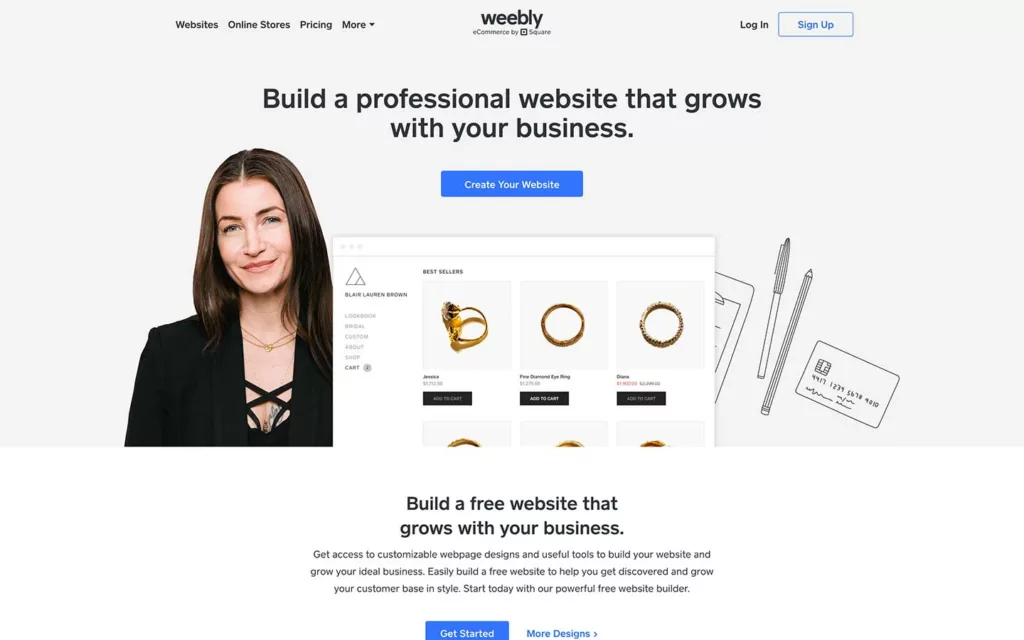
Weebly
Weebly is a website builder with a user-friendly platform for creating websites and online stores. It offers a drag-and-drop interface, pre-designed templates, and various components and functionalities catering to individuals, small businesses, and e-commerce ventures.
One of the critical features of Weebly is its website builder, which allows users to create websites without the need for coding or specialized expertise. It offers a drag-and-drop interface, allowing users to easily add and customize elements such as text, images, videos, forms, and more. Weebly also provides a wide range of professionally designed templates that help to match the style and branding of websites.
Weebly offers e-commerce capabilities, allowing users to create online stores and sell products or services. It provides product management, inventory management, order management, and payment processing features. Weebly also offers customizable shopping cart and checkout options and integration with various payment gateways.
Weebly provides a range of customization options for websites, including adding and managing pages, creating blogs, setting up forms, configuring SEO settings, and more. It also offers a powerful theme customization interface, allowing users to customize their website’s design, layout, and color scheme.
Weebly offers built-in SEO features, including options for meta tags, alt tags, URL customization, and more, to help enhance the search engine visibility of websites. It also provides opportunities for social media integration, email marketing, and analytics tools to help users promote their websites and track performance.
Weebly offers a mobile app for users to manage their websites and online stores. It provides features such as website editing, order management, inventory management, and more, making it convenient for users to manage their online presence from anywhere.
Weebly offers 24/7 customer support through various channels, including live chat, email, and phone. It also provides an extensive knowledge base and community forum to help users create and manage their websites.
Weebly is a user-friendly website builder offering various features and functionalities for creating websites and online stores. Its drag-and-drop interface, pre-designed templates, customization options, e-commerce capabilities, and SEO features make it a popular choice for individuals, small businesses, and e-commerce ventures looking to establish their online presence.